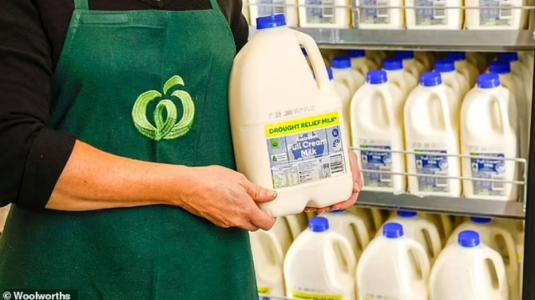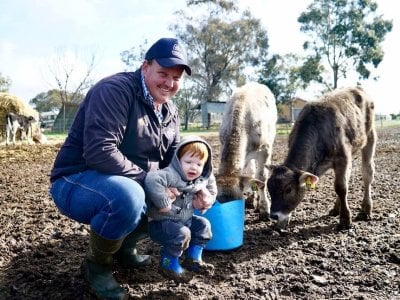Rising milk prices leave Aussies wondering: who pockets the extra cash?
Aussies are bearing the brunt of supermarket price increases. It seems that products on every aisle are becoming more expensive as of late.
We previously reported significant jumps in the cost of lettuce and broccoli since 2020, as well as meats, pasta, and bread.
Dairy products, including milk, were not spared in the price hike. The ‘exacerbated health inequality’ made Deakin University researchers call on the government to subsidise farmers.
One Aussie began an interesting conversation on the social news website Reddit, wondering who benefits the most from the increase.
They said: ‘Woolworths milk 2L has recently risen from $2.40 to $3.10. My question: Are these extra 70 cents going to the dairy farmers? Does anyone know? Just hoping that Woolworths isn’t pocketing the money, especially after all that “drought relief” surcharge stuff.’

Woolworths increased the price of its brand milk in July, following Coles’ move. Credit: Woolworths/DailyMail
Last month, we wrote about the ‘quiet hike’ in Coles brand milk due to rising costs in packaging and transportation. Woolworths soon followed, adding 50 cents to its previously $2.40-2L bottles.
A top comment on the Reddit post said that farmers do profit, but there’s a lot more nuance than that: ‘The farmgate prices for milk solids is the highest it's been in years, anywhere from $9-10+ per kg. Farmers are paid on the dry weight. This is pushing the cost of fresh milk and all dairy-related products up. The challenge for all farmers is that inputs are increasing that offset this, which are fertiliser and feed.’ These higher running costs eat into farmers’ profits.
Another Redditor commented: ‘It's the milk processors, not the supermarkets, that set the farmgate price that is actually paid to farmers. Farmers are getting more for milk and milk solids than ever before.’
Coles previously emphasised that the hike will result in higher earnings for farmers. Coles Chief Commercial Officer Leah Weckert said: ‘Raising prices is never something we do lightly. However, the increased supply chain costs we are seeing, including higher payments to dairy farmers and processors, have necessitated these increases in Coles brand milk products.
‘The feedback we’ve received from farmers and processors following the recent increases in farmgate and wholesale prices has been very positive, and we hope customers will help us continue to support them by purchasing their great quality Australian milk.’
A spokesperson from Woolworth echoed the sentiment.
The United Dairy Farmers of Victoria pointed out that farmers were facing supply chain issues that justified the increase. 'Fertiliser costs have gone through the roof, we've got significant costs around energy, grain that we feed to our cows – all of those have gone up significantly, particularly post the Ukraine war,' Mark Billing, the organisation’s vice-president, told 3AW radio.
It also doesn’t help that the demand for milk has gone up, while milk production in Australia is down 3.4 per cent, according to Rabobank. Experts predicted that the decline would be at least 250 million litres in June, with higher costs of fertiliser and fuel, flooding, and a shortage of farmers as the main causes.
On the Reddit post, some Aussies encouraged others to buy branded or from farmers directly to support them. One said, 'If you want to support dairy farmers, buy their milk, not the supermarket brand.’
However, others have pointed out that supermarkets do not control dairies. A Redditor said: ‘Supermarket milk is farmer's milk. They don't own dairies. They negotiate a bulk buy price from farmers for supply each year, and use milk as a loss leader to get people through the door, so farmers get pretty much the same per litre if you buy farmer's own or supermarket brand milk.’
Many farmers could not help but feel relieved about the increase, even with the added costs in production. Rick Gladigau, president of the Australian Farmers Association, said that the hike resulted partly because of supermarkets’ decisions in the last few years.
Some of you might remember when retail giants, led by Coles, began selling 1L milk bottles for $1 back in 2011, a move many farmers opposed. The Australian Farmers Association warned supermarkets that it could be disastrous in the long run.
In 2016, prices were further cut after the Murray Goulburn Co-operative ran into financial problems, spiralling into a national dairy crisis. Farmers were paid less than production costs, which led to dairy farm labourers opting out of the industry.
But now, ‘it's all coming home to roost,’ according to Gladigau.
In an interview with ABC News, dairy farmer Ben Govett from northern Victoria said he was glad to see things turn around since 2016. ‘For several years, most of us openly admitted we're only doing it for the love of cows and the love of farming — there was no financial benefit in it,’ he said. They struggled to pay bills every month, on top of dealing with stress and mental health issues.
Govett said that the current supermarket prices had uplifted the community after the last years took a toll on them: ‘For most of us, it is a very emotional thing, when you work so hard and your product is not valued.’
He emphasised, though, that even with the rising production costs, customers will still get milk products that are safe and of a high standard.
What do you think, everyone? How are you coping with the increasing price of milk products? We’d love to know your thoughts.
We previously reported significant jumps in the cost of lettuce and broccoli since 2020, as well as meats, pasta, and bread.
Dairy products, including milk, were not spared in the price hike. The ‘exacerbated health inequality’ made Deakin University researchers call on the government to subsidise farmers.
One Aussie began an interesting conversation on the social news website Reddit, wondering who benefits the most from the increase.
They said: ‘Woolworths milk 2L has recently risen from $2.40 to $3.10. My question: Are these extra 70 cents going to the dairy farmers? Does anyone know? Just hoping that Woolworths isn’t pocketing the money, especially after all that “drought relief” surcharge stuff.’

Woolworths increased the price of its brand milk in July, following Coles’ move. Credit: Woolworths/DailyMail
Last month, we wrote about the ‘quiet hike’ in Coles brand milk due to rising costs in packaging and transportation. Woolworths soon followed, adding 50 cents to its previously $2.40-2L bottles.
A top comment on the Reddit post said that farmers do profit, but there’s a lot more nuance than that: ‘The farmgate prices for milk solids is the highest it's been in years, anywhere from $9-10+ per kg. Farmers are paid on the dry weight. This is pushing the cost of fresh milk and all dairy-related products up. The challenge for all farmers is that inputs are increasing that offset this, which are fertiliser and feed.’ These higher running costs eat into farmers’ profits.
Another Redditor commented: ‘It's the milk processors, not the supermarkets, that set the farmgate price that is actually paid to farmers. Farmers are getting more for milk and milk solids than ever before.’
Coles previously emphasised that the hike will result in higher earnings for farmers. Coles Chief Commercial Officer Leah Weckert said: ‘Raising prices is never something we do lightly. However, the increased supply chain costs we are seeing, including higher payments to dairy farmers and processors, have necessitated these increases in Coles brand milk products.
‘The feedback we’ve received from farmers and processors following the recent increases in farmgate and wholesale prices has been very positive, and we hope customers will help us continue to support them by purchasing their great quality Australian milk.’
A spokesperson from Woolworth echoed the sentiment.
The United Dairy Farmers of Victoria pointed out that farmers were facing supply chain issues that justified the increase. 'Fertiliser costs have gone through the roof, we've got significant costs around energy, grain that we feed to our cows – all of those have gone up significantly, particularly post the Ukraine war,' Mark Billing, the organisation’s vice-president, told 3AW radio.
It also doesn’t help that the demand for milk has gone up, while milk production in Australia is down 3.4 per cent, according to Rabobank. Experts predicted that the decline would be at least 250 million litres in June, with higher costs of fertiliser and fuel, flooding, and a shortage of farmers as the main causes.
On the Reddit post, some Aussies encouraged others to buy branded or from farmers directly to support them. One said, 'If you want to support dairy farmers, buy their milk, not the supermarket brand.’
However, others have pointed out that supermarkets do not control dairies. A Redditor said: ‘Supermarket milk is farmer's milk. They don't own dairies. They negotiate a bulk buy price from farmers for supply each year, and use milk as a loss leader to get people through the door, so farmers get pretty much the same per litre if you buy farmer's own or supermarket brand milk.’
Many farmers could not help but feel relieved about the increase, even with the added costs in production. Rick Gladigau, president of the Australian Farmers Association, said that the hike resulted partly because of supermarkets’ decisions in the last few years.
Some of you might remember when retail giants, led by Coles, began selling 1L milk bottles for $1 back in 2011, a move many farmers opposed. The Australian Farmers Association warned supermarkets that it could be disastrous in the long run.
In 2016, prices were further cut after the Murray Goulburn Co-operative ran into financial problems, spiralling into a national dairy crisis. Farmers were paid less than production costs, which led to dairy farm labourers opting out of the industry.
But now, ‘it's all coming home to roost,’ according to Gladigau.
In an interview with ABC News, dairy farmer Ben Govett from northern Victoria said he was glad to see things turn around since 2016. ‘For several years, most of us openly admitted we're only doing it for the love of cows and the love of farming — there was no financial benefit in it,’ he said. They struggled to pay bills every month, on top of dealing with stress and mental health issues.
Govett said that the current supermarket prices had uplifted the community after the last years took a toll on them: ‘For most of us, it is a very emotional thing, when you work so hard and your product is not valued.’
He emphasised, though, that even with the rising production costs, customers will still get milk products that are safe and of a high standard.
What do you think, everyone? How are you coping with the increasing price of milk products? We’d love to know your thoughts.








